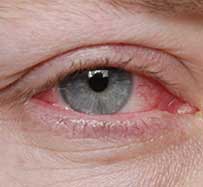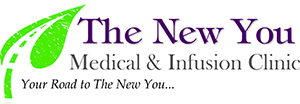Pink Eye Specialist in Carrollton, TX

What Is Pink Eye?
Conjunctivitis, or pink eye, is the swelling of the clear covering of the white of the eye and the inside of the eyelid known as the conjunctiva. The name pink eye comes from the fact that the blood vessels in the conjunctiva dilate, giving the eyes a red, bloodshot appearance.
Pink eye can be either infectious or non-infectious, and infectious conjunctivitis is extremely contagious. Thankfully, pink eye is a common condition that is easily treated, usually with antibiotics. To schedule a consultation with a pink eye specialist in Carrollton, please call (817) 203-2760 or contact The New You Medical & Infusion Clinic online.
Causes of Pink Eye
Pink eye has a variety of potential causes, some contagious and some not. Treatment, symptoms, and duration of pink eye depend on its cause.
Viral Pink Eye
Viral pink eye is caused by a virus, and can co-occur due to a cold, other respiratory infections, or the herpes virus. This form of pink eye ordinarily resolves itself without medical treatment, but is highly contagious. Viral pink eye can affect one or both eyes.
Bacterial Pink Eye
This form of pink eye is caused by bacteria like staph and gonorrhea, and can co-occur with other bacterial infections. Wearing contact lenses that haven’t been properly cleaned or belong to someone else can cause bacterial pink eye. Bacterial conjunctivitis requires medical treatment, as it may cause serious damage to the eye if left untreated. Bacterial pink eye can affect one or both eyes.
Allergic Pink Eye
This form of pink eye occurs in both eyes and is caused by an allergic reaction. Allergic reactions happen in response to triggers called allergens, which can include pollen, dust mites, and pet dander. Exposure to allergens results in the immune system releasing chemicals that cause swelling in the conjunctiva, resulting in pink eye.
Pink Eye Caused by Irritation
Pink eye can be caused by various irritants, including chemical splashes, smoke, fumes, or a foreign object like an eyelash. The swelling that is characteristic of pink eye can also occur in response to flushing of the eye done to remove a chemical or foreign object.
Pink Eye Symptoms
The most notable conjunctivitis symptom is the one for which it is named: bloodshot, red eyes caused by swelling in the conjunctiva. Other symptoms include:
- Itching or burning in the eyelids
- Swollen or tender areas in front of the ears
- Excessive tear production (lachrymation)
- Clear drainage
- Light sensitivity (photophobia)
Duration of symptoms will depend on the type of pink eye. Viral pink eye may last up to two to three weeks and bacterial pink eye may last up to a month or longer, while pink eye caused by an irritant often resolves itself within about twenty-four hours. Allergic pink eye may persist as long as the patient is exposed to the causative allergen.
Pink Eye Diagnosis
Allergic, viral, and irritant-related pink eye may resolve on their own, but it may be difficult to determine the cause of pink eye without help from a conjunctivitis doctor. A healthcare provider can almost always diagnose conjunctivitis by asking questions about your symptoms and medical history, but in some cases, your provider may take a sample of eye discharge from the symptomatic eye and have it tested in a laboratory to determine the cause.
All pink eye presents with redness and swelling, but other symptoms can vary slightly depending on the cause. Eye discharge caused by bacterial conjunctivitis is likely to be thicker than that caused by viral conjunctivitis, and itchy eyes is most common with allergic conjunctivitis.
Pink Eye Treatment
Treatment for conjunctivitis often involves prescription medication and home remedies to help alleviate pain and discomfort. Also, while antibiotics are most likely to come to mind when one thinks of pink eye treatment, other prescription medications may be appropriate depending on the type of pink eye.
Medical Treatments for Pink Eye
Prescription medications for pink eye will depend on the type of pink eye. A pink eye doctor or healthcare provider will prescribe antibiotics, usually in the form of eye drops, for bacterial conjunctivitis. Other medications for pink eye may include:
- Antihistamines or mast cell stabilizers to stop the allergic reaction (allergic pink eye)
- Anti-inflammatory drugs like decongestants or steroids to control swelling (allergic pink eye)
- Antiviral medication (viral pink eye caused by the herpes simplex virus)
Pink Eye Home Remedies
There are several home treatments that may soothe the symptoms of pink eye, including:
- Cleaning affected eyes with a clean, wet cloth
- Cold or warm compresses (cold for allergic pink eye, warm for bacterial or viral pink eye)
- Artificial tears to relieve dryness
- Avoiding wearing contact lenses
- Taking over-the-counter allergy medications for allergic pink eye
Pink Eye Prevention
Viral and bacterial pink eye are highly contagious. Both are spread through contact with drainage from an infected eye, which contains the infectious agent (virus or bacteria). The following tips can help prevent the spread of pink eye:
- Avoid touching your eyes
- Do not share linens, towels, or handkerchiefs
- Change pillowcases frequently
- Do not share eye makeup or eye personal care items
- Do not use eye makeup while infected, and replace all eye makeup used prior to the infection
- Do not wear contacts while infected
- Do not share eye medicine
- Wash your hands after using eye medicine
Allergic conjunctivitis can only be avoided by avoiding allergens. This can be done by:
- Keeping windows closed during allergy seasons
- Washing your bedding frequently in hot water
- Using mite-proof bedding covers
- Cleaning floors with a damp rag or mop, and using a vacuum cleaner
- Using air conditioning in your home and car, and a dehumidifier to prevent mold
- Avoiding household pets, or at the very least, keeping them out of the bedroom
- Not hanging clothing outdoors to dry
- Wearing glasses or sunglasses when outside to protect your eyes
In the case of preventing pink eye caused by irritants, wearing eye protection when working with chemicals or during exposure to wind, heat, or cold may be effective preventive measures.
Contact Pink Eye Specialist in Carrollton
Pink eye often heals on its own, but it can also be serious, especially bacterial pink eye.
To request more information about pink eye treatment or schedule a consultation with a pink eye specialist in Carrollton, call (817) 203-2760 or contact The New You Medical & Infusion Clinic online.
The New You Medical & Infusion Clinic
Address
100 Grapevine HwyHurst, TX 76054
(817) 203-2760
https://www.newyoumedclinic.com/
Hours
Mon:
10:00 am - 6:00 pm
Tue:
10:00 am - 6:00 pm
Wed:
10:00 am - 6:00 pm
Thu:
10:00 am - 6:00 pm
Fri:
Closed
Sat:
Closed
Sun:
Closed

